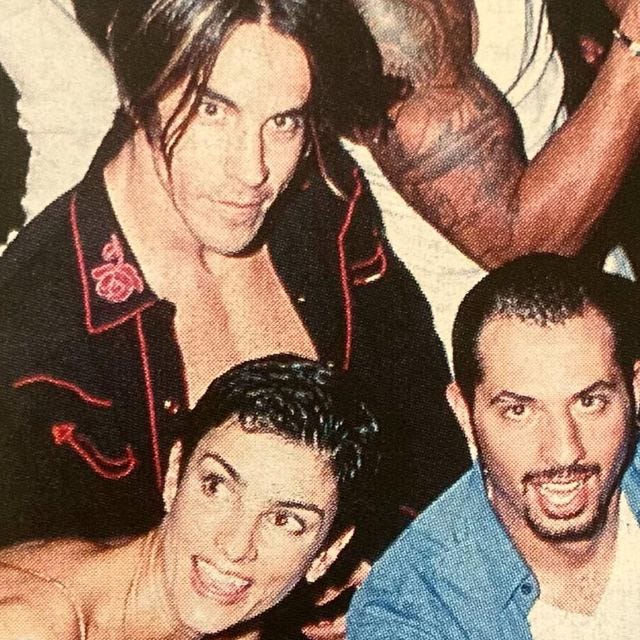Fluxblog 427: second wave new wave + King Gizzard and the Lizard Wizard explained
Plus new songs from The Smile, Sam Burton, Olivia Rodrigo, and 6lack
This week’s playlist is SECOND WAVE NEW WAVE 1983-1986, a follow up to my recent playlist covering the first wave of new wave. This covers the period after the launch of MTV in which new wave goes very mainstream, and the vibe shifts away from the scene’s roots in punk and more towards what we know understand as synth pop. [Spotify | Apple | YouTube]
I recently wrote a piece for NPR about King Gizzard and the Lizard Wizard that was ostensibly a review of their new record PetroDragonic Apocalypse, but is mostly an explanation of the band’s whole deal aimed at people who’ve been mystified by this band with a super silly name getting big enough to headline some pretty major venues like Red Rocks, the Hollywood Bowl, and Forest Hills Stadium.
The key to understanding the King Gizzard phenomenon is a willingness to imagine disparate categories in dense overlap, well beyond anything our post-genre pop era might have prepared us for. The group's six musicians live at the center of a very unlikely Venn diagram: stylistic chameleons on par with Beck and Damon Albarn, prolific at a rate that outpaces even the famously hyper-productive Guided By Voices, mounting completely unpredictable live shows with the jam band ethos of Phish. Led by 32-year-old primary songwriter Stu Mackenzie, they have released 24 studio albums since 2010, five of which dropped in 2022. (Two of those, the MGMT-ish Omnium Gatherum and the groovy jazz-fusion opus Ice, Death, Planets, Lungs, Mushrooms, and Lava, are good entry points for the uninitiated.) The records tend to be organized around genre and musical high concepts — garage rock, various flavors of psychedelia, electronic excursions, prog, blue-eyed soul and several albums exploring the possibilities of microtonal tunings.
Time Is Kind Of Frozen
The Smile “Bending Hectic”
Two big musical swerves happen in the final third of “Bending Hectic.” The first is the arrival of a screeching atonal string section, something you’d expect from Jonny Greenwood in the years since he transitioned into becoming one of the most in-demand film score composers. (In fact, it sounds a lot like what he did for Paul Thomas Anderson’s There Will Be Blood.) The second is a burst of heavy grunge guitar, which along with thudding drums and soaring Thom Yorke vocals provides a genuine catharsis for a song that is mostly so delicate and minimal that it sounds as though it could get blown away with a slight breeze. That second part is a wild curveball for Greenwood and Yorke, who I think most anyone would have reasonably assumed were done with this sort of sound sometime during the first Clinton administration. But maybe the feel free to do this sort of thing without the baggage of being called Radiohead, or maybe this is a mode they just wanted to try out with Tom Skinner on drums. But really this is just a logical place for this song to go, a storm following all that eerie stillness.
Buy it from Bandcamp.
Every Voice That Awaits Reply
Sam Burton “Long Way Around”
“Long Way Around” is a very 70s sort of song in its arrangement – light country pop with melodramatic yet sort of understated orchestration – but also in its lyrics, which matter-of-factly express the melancholy of the ramblin’ man. Sam Burton sings about a relationship that’s been deferred on account of his wandering with a gentle ambivalence in his voice, as though he’s just starting to realize that he’s been running away from someone who genuinely wants him. The song puts up a front of stoicism but the longing and regret in this music is heavy and unmistakable. The strings carry a lot of this emotional weight but the most endearing element is Burton’s voice, which has a warm, honeyed tone not unlike a young Willie Nelson.
Buy it from Bandcamp.
Some Forbidden Paradise
Olivia Rodrigo “Vampire”
The most appealing thing about Olivia Rodrigo’s music to me is how it always seems as though she and her songwriting partner Dan Nigro are trying to write the next great karaoke staple. If that’s the case they’ve already succeeded a few times over, and I think “Vampire” has a shot too, though I think it’s more of a “for the heads” song than, say, “Drivers License” or “Good 4 U.” The songs have the raw punch of alt-rock but the calculated bombast of musical theater, which turns out to be an incredible vehicle for delivering lyrics that directly express very adolescent forms of anguish. I don’t mean that in a condescending way – the beauty of Rodrigo’s writing is in how she articulates the sort of conflicts, resentments, and heartaches that seem much more enormous and world-shattering at a young age than they do with a bit more time and experience. It’s all exaggerated but totally accurate, and I think for anyone who’s outgrown this mindset the songs provide a way back into those intense young emotions.
“Vampire” is a song about betrayal, but more specifically it’s a classic “now that I’m famous, I can’t trust people” type of song. It’s about blood suckers, fame fuckers, and people who sell you off for parts. It’s a song that will resonate for anyone who worries about “fake friends” regardless of their actual status. The thing that really makes this work is how Rodrigo sounds genuinely hurt and surprised through the whole song, as though she simply never considered the music industry wasn’t built around exactly the sort of relationship she describes in the song. A lot of young musicians will almost preemptively write songs like this, it’s such a part of the standard star narrative, but this is very much coming from a warm and uncalloused heart. She’ll inevitably get to that pragmatic defensiveness later, but this song is like listening to a loss of innocence in real time.
Buy it from Amazon.
Just Leap Into Love
6lack “Inwood Hill Park”
“Inwood Hill Park” is a snapshot of a relationship in an interesting moment – they’re established enough to have gone through a lot in the past, they’re fresh enough that the passion still runs very strong, but he’s so deep in his head about external stress that he’s reaching out to her in the hope that she can snap him out of it. I think some people might ungenerously look at this as a song about a guy asking for “emotional labor,” but I think the song works because it’s coming from a place of reverence and genuine intimacy. There’s a lot of lyrics in this song that are basically 6lack talking about career anxieties and a desire for artistic growth, and I think to some extent he’s putting those thoughts into a romantic song to convey the sort of trust he has in her. The mood of the music is a little ambiguous, with depressive angst mingling with horniness and a slight standoffishness. He’s so distracted that even the most directly sexual lines are hedged a bit in the phrasing, like when he sings “that pussy is…uh… elite.”
Buy it from Amazon.
LINKS LINKS LINKS LINKS LINKS LINKS
• I quite liked the new Song Exploder episode in which Natalie Merchant talks a lot about preserving the legacy of women of her mother's generation, to not have them written out of the story as they disappear.
• The Steely Dan newsletter Expanding Dan has the actual tape of the famous lost song “The Second Arrangement.”
• Molly O’Brien wrote a great blog post about the weird vagueness of Harry Styles’ mega-hit “As It Was” and how great enduring songs tend to have some sense of exuberance to them.
• Brian Hiatt at Rolling Stone did some strong reporting on the actual uses of AI in contemporary music, and where the technology is going in the next few years.





